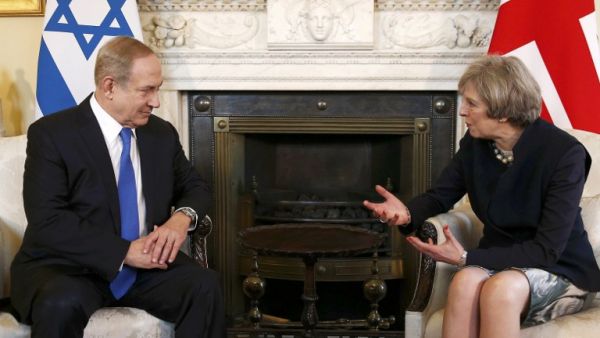Ahead of his meeting with Donald Trump next week, Israeli Prime Minister Benjamin Netanyahu yesterday headed to London to meet with the British Prime Minister, Theresa May.
Many in Britain have questioned May’s decision to meet with her Israeli counterpart, who has ignored the most recent UN resolution on settlement building, instead approving hundreds of new illegal housing units in a Palestinian neighborhood.
In fact, May has welcomed a somewhat dubious selection of foreign visitors since taking the reins last year.
Mrs May adds Netanyahu to Trump and Turkey's Erdogan to her list of leaders met: Democrats all!
— Jon Snow (@jonsnowC4) February 6, 2017
Trump, Erdogan and Netanyahu. Tasteful choice of visits from Theresa May.
— Michael (@TheRightArticle) February 6, 2017
Many pro-Palestinian activists have suggested that Netanyahu, whose government is accused by some of perpetrating war crimes during the 2014 Gaza war, should have been excluded from visiting Britain.
War criminal Netanyahu should not be invited to UK. https://t.co/BXkw0VctlZ
— Susi H (@palestininianpr) February 2, 2017
In 2015, a petition to have Netanyahu arrested for war crimes on a separate visit to the British capital received 114,122 signatures. The government dismissed the request, indicating in their response that “under UK and international law, visiting heads of foreign governments […] have immunity from legal process.”
This is not the first time similar accusations have been raised against Netanyahu on visits to Europe. In 2016, a former Dutch Prime Minister, Dries van Agt, suggested that his country “could have sent him straight away to the international criminal court – that would have been better,” instead of welcoming him as a guest.
Protesters gathered outside Downing Street, the Prime Minister’s residence, on Monday to demonstrate against Netanyahu’s visit.
Join us tomorrow to protest at Netanyahu's meeting with Theresa May. Opposite Downing St from 11.30am https://t.co/QhwnLUHG1Y pic.twitter.com/cK7cG9AYoi
— PSC (@PSCupdates) February 5, 2017
Speaking at the protest, Baroness Tonge, a peer in the UK’s House of Lords, said that she is “sick to death of the way the Israeli government behaves.”
“I don’t want Theresa May to have any more talks with Netanyahu… What we need, Theresa May, is action, and that means sanctions against Israel”, as well as boycotts on settlement goods.
“Palestine will be free one day,” she concluded.
Opposition leader, Jeremy Corbyn, was among those who urged the Prime Minister to take a harder line with the Israeli PM.
Today, Theresa May must make clear to Netanyahu that the British government will stand unequivocally behind the rights of Palestinian people pic.twitter.com/8y7kyI0oEo
— Jeremy Corbyn MP (@jeremycorbyn) February 6, 2017
Away from Palestinian issues, many were also concerned about the Israeli leader’s influence on British policy towards Iran. During the meeting, Netanyahu urged May to adopt renewed sanctions against Iran, following Tehran's test-firing of a ballistic missile last week.
I see Netanyahu is over here to give Theresa May her orders. Watch how our Foreign policy changes towards Iran. UK puppets #bbcdp @LBC
— #MurdochsDemocracy (@evertonfc2) February 6, 2017
@MiddleEastEye @justmebeingme4 Netanyahu must not be allowed to steer the West into war with #Iran. @theresa_may Enough of M/East meddling!
— Olufemi Okeniyi (@femiokes) February 6, 2017
However, speaking in Parliament after the meeting, the British Prime Minister suggested that she would not be swayed when it came to Iran sanctions.
“We continue to believe the Iran nuclear deal was an important step forward and important contribution to stability in the region and we continue to support it,” she said.
Following the visit, Netanyahu thanked May for her “warm welcome”, suggesting that it reflected the strength of bilateral ties between their two nations.
Meanwhile, many in the UK would rather that partnership was a little weaker, particularly after a recent video showed an Israeli diplomat boasting of his ability to influence British politics.
RA







